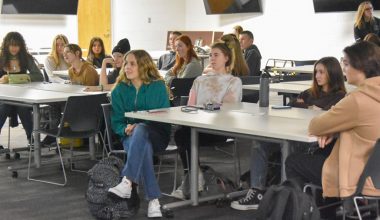As students embrace the goal of making the cut, a high grade point average (GPA) will put them on the fast track to academic success. At UCSD, it is not uncommon for students to feel the pressure to add some extra points to their overall GPA, and the college load is no exception.
However, UCSD is known for its classes, notorious for having a manageable workload and a somewhat moderate difficulty. Fortunately, UCSD allows students to enroll in courses acclaimed for having less demanding assignments and more straightforward grade requirements.
This article will explore those Easy Classes that students of the University of California, San Diego can take that will help them with their GPAs while maintaining the quality of their education.
Table of contents
- 1. MUS 15: Understanding Music
- 2. PSYC 1: Introduction to Psychology
- 3. COGS 1: Introduction to Cognitive Science
- 4. TDAC 1: Introduction to Theatre, Dance, and Performance Studies
- 5. SOCI 1: Introduction to Sociology
- 6. ANTH 1: Introduction to Anthropology
- 7. POLI 10: Introduction to American Politics
- 8. LTEN 21: Introduction to Popular Culture
- 9. ETHN 1: Introduction to Ethnic Studies
- 10. ECON 1: Principles of Microeconomics
- 11. COMM 10: Public Speaking
11 Easy Classes At UCSD To Boost Your GPA
Here are USCD easy classes that can help boost your GPA
1. MUS 15: Understanding Music
MUS 15, also known as Understanding Music, is one of the UCSD easy classes that introduces the essential elements of music. The course is designed for students with little music theory or performance background. It aims to develop a fundamental understanding and appreciation of music.
In MUS 15, you can explore musical concepts such as melody, rhythm, harmony, and form. The class typically involves listening to different styles and genres of music, attending live concerts, and analyzing musical compositions. You may also learn about various musical periods’ historical and cultural contexts.
The workload for MUS 15 often includes readings, listening assignments, and written assignments or exams. The class is structured to be accessible and engaging for students from diverse academic backgrounds. It can be an excellent opportunity to explore the world of music, develop critical listening skills, and gain a deeper understanding of music’s artistic and expressive aspects.
2. PSYC 1: Introduction to Psychology
PSYC 1 is one of UCSD easy classes. It’s an introductory course that provides a broad overview of psychology. It covers various topics such as the history of psychology, biological bases of behavior, sensation and perception, learning and memory, social psychology, and abnormal psychology.
The course aims to familiarize students with the fundamental theories, concepts, and research methods used in studying human behavior and mental processes. It typically involves attending lectures, participating in discussions, and completing readings and assignments.
PSYC 1 is often considered an easy class because it does not require any prior knowledge of psychology. The material covered in the course is generally accessible and engaging for students from different majors.
However, it’s important to note that the workload can vary depending on the professor and their teaching style. Some instructors may incorporate group projects, presentations, or exams, while others focus more on readings and written assignments.
Related Post: 12 Best Industrial And Product Design Colleges 2024
3. COGS 1: Introduction to Cognitive Science
COGS 1 is one of UCSD easy classes. It is an introductory course that provides an overview of the interdisciplinary field of cognitive science. The course combines elements of psychology, computer science, linguistics, neuroscience, and philosophy to study the mind and intelligence.
In COGS 1, you will explore perception, attention, memory, language, problem-solving, and artificial intelligence. The course introduces students to the various approaches and methods to understand cognitive processes and behavior.
COGS 1 typically involves attending lectures, participating in discussions, completing readings, and engaging in hands-on activities. The workload may include assignments, exams, or research projects.
The course is designed to be accessible to students from diverse academic backgrounds and does not assume prior knowledge in any specific discipline.
COGS 1 can be an exciting and relatively easy class for students curious about the workings of the human mind and who enjoy interdisciplinary approaches to learning. It provides a foundation for further study in cognitive science or related fields.
4. TDAC 1: Introduction to Theatre, Dance, and Performance Studies
TDAC 1, also known as Introduction to Theatre, Dance, and Performance Studies, is a course offered at UCSD that provides an introductory overview of performing arts. It aims to familiarize students with the fundamental concepts, theories, and practices of theater, dance, and performance studies.
TDAC 1 is one of UCSD’s easy classes. It’s designed to be accessible and engaging, suitable for majors and non-majors, and is often considered one of the more accessible classes at UCSD.
The course covers a broad range of topics related to theatre, dance, and performance, including the history of performance, different performance traditions from around the world, elements of performance (such as acting, movement, and stage design), and the social, cultural, and political implications of performance.
Students can explore various forms of live performance, including plays, musicals, dance performances, and experimental theater. One key objective of TDAC 1 is to develop students’ critical thinking skills and ability to analyze and interpret performances.
Students will be exposed to different theoretical frameworks and approaches to understanding and evaluating performances throughout the course. They will learn how to engage in thoughtful discussions and write analytical essays about the performances they have seen.
Related Post: University of California-Berkeley College Majors Data
5. SOCI 1: Introduction to Sociology
SOCI 1, also known as Introduction to Sociology, is a course offered at UCSD that provides an overview of sociology. This introductory course is one of UCSD’s easy classes. It’s designed to introduce students to the foundational concepts, theories, and methods of sociology and foster a sociological imagination in them.
SOCI 1 is often considered one of the more accessible classes at UCSD, as it offers a comprehensive introduction to sociology without extensive prerequisite knowledge.
The course covers a wide range of sociology topics, including social institutions, social stratification, socialization, culture, race and ethnicity, gender, deviance, social change, and globalization.
Through these topics, students understand how societies are structured, how individuals are influenced by social forces, and how social change occurs.
SOCI 1 aims to develop students’ critical thinking skills and ability to analyze social phenomena from a sociological perspective. Throughout the course, students will be exposed to various theoretical frameworks and research methods used in sociology.
They will learn to evaluate sociological theories critically, apply them to real-world examples, and discuss social issues and problems.
6. ANTH 1: Introduction to Anthropology
ANTH 1, or Introduction to Anthropology, is a course offered at UCSD that provides students with a comprehensive introduction to anthropology. Anthropology studies human societies and cultures, and ANTH 1 aims to familiarize students with its key concepts, theories, and methods.
This course is often considered one of the more accessible classes at UCSD. It provides a broad overview of anthropology without requiring extensive prior knowledge.
ANTH 1 covers the four major subfields of anthropology: cultural anthropology, archaeology, biological anthropology, and linguistic anthropology. Students will explore cultural diversity, kinship systems, social organization, human evolution, material culture, language and communication, and the interpretation of archaeological artifacts.
By studying these different subfields, students gain a holistic understanding of human beings and how they interact with their environments.
Related Post: 20 Best Pre-Physical Therapy Studies Colleges 2024
7. POLI 10: Introduction to American Politics
POLI 10, or Introduction to American Politics, is a course offered at UCSD that provides students with a comprehensive introduction to studying American politics and government.
This course will familiarize students with the key concepts, institutions, and processes that shape American politics. It is often considered one of the more accessible classes at UCSD due to its introductory nature and the familiarity of the subject matter to many students.
POLI 10 covers a broad range of topics related to American politics, including the Constitution, federalism, the three branches of government (executive, legislative, and judicial), political parties, interest groups, elections, public opinion, and public policy.
Through exploring these topics, students understand how political power is distributed, how decisions are made, and how policies are formulated and implemented in the United States.
8. LTEN 21: Introduction to Popular Culture
LTEN 21, or Introduction to Popular Culture, is a course offered at UCSD that provides students with an introduction to studying popular culture. It is one of UCSD’s easy classes.
It explores various forms of popular culture, such as music, film, television, literature, fashion, and social media, and analyzes their significance in contemporary society. LTEN 21 is often considered one of the more accessible classes at UCSD, as it offers a fun and accessible approach to understanding popular culture.
The course examines popular culture critically and interdisciplinary, drawing on theories and methodologies from literature, media studies, sociology, and cultural studies.
Students will explore topics such as popular culture’s production and consumption, identity construction, impact on social norms and values, and the relationship between popular culture and power dynamics.
LTEN 21 encourages students to engage with famous cultural artifacts and texts, critically analyzing their meanings, messages, and social implications. Students will develop skills in cultural analysis, media literacy, and critical thinking through discussions, assignments, and projects.
They will also have the opportunity to explore their interests in popular culture and engage in creative and reflective activities.
Related Post: 25 Best Pharmaceutical Sciences Colleges in 2024
9. ETHN 1: Introduction to Ethnic Studies
ETHN 1, or Introduction to Ethnic Studies, is one of UCSD’s easy classes. It provides students with an introduction to the interdisciplinary field of Ethnic Studies.
This course explores the experiences, histories, and social structures of various ethnic and racial groups in the United States. ETHN 1 is often considered one of the more accessible classes at UCSD, as it offers foundational knowledge and perspectives on race, ethnicity, and social justice issues.
The course covers a range of topics related to Ethnic Studies, including the historical experiences of different ethnic and racial groups, the construction of race and ethnicity, social inequality, immigration, assimilation, cultural preservation, and activism.
By exploring these topics, students gain a deeper understanding of the complexities and diversity of American society.
10. ECON 1: Principles of Microeconomics
ECON 1, or Principles of Microeconomics, is a course offered at UCSD that provides students with an introduction to the fundamental principles and concepts of microeconomics. It is one of the easy classes at UCSD.
This course examines the behavior of individual economic agents, such as consumers, firms, and markets, and analyzes how their interactions shape resource allocation. Due to its structured and logical approach to economic theory, ECON 1 is often considered one of the more accessible classes at UCSD.
The course covers a range of topics within microeconomics, including supply and demand, market equilibrium, consumer behavior, production and cost analysis, market structures (such as perfect competition, monopoly, and oligopoly), and the role of government in the economy.
Through exploring these topics, students understand how individuals and firms make decisions in response to scarcity and how markets function.
ECON 1 introduces students to economic models and analytical tools used in microeconomic analysis. Students learn how to apply these models to real-world situations, assess the costs and benefits of different choices, and evaluate the efficiency of markets.
The course also emphasizes developing critical thinking skills, as students are encouraged to think analytically and engage in economic reasoning.
Related Post: What Are the Pros and Cons of Using 529 Plans? What it is & How it Works
11. COMM 10: Public Speaking
COMM 10, or Public Speaking, is a course offered at UCSD that focuses on developing effective communication and presentation skills. This is one of UCSD easy classes that can boost your GPA.
This course aims to enhance student’s ability to express themselves confidently, articulate their ideas clearly, and engage with audiences in various contexts.
COMM 10 is often considered one of the more accessible classes at UCSD because it provides a structured and supportive environment for students to develop their public speaking skills.
The course covers a range of topics related to public speaking, including speech preparation, audience analysis, organization and structure, delivery techniques, visual aids, and persuasive communication.
Through practical exercises and presentations, students learn how to develop and deliver informative and persuasive speeches that effectively engage and influence their audience.
COMM 10 allows students to practice public speaking in a supportive and constructive environment. Students receive feedback from their peers and the instructor, refining their communication skills and gaining confidence in their ability to deliver effective presentations.
The course also emphasizes critical thinking and active listening skills, as students are encouraged to evaluate and respond to speeches given by their classmates.
Related Post: Best Meteorology Colleges 2024
Frequently Asked Questions
An “easy” class at UCSD typically refers to a relatively less demanding course in terms of workload, difficulty with content, and grading expectations. These classes are often designed to provide a broad introduction to a subject or require minimal prerequisite knowledge, allowing students to explore new areas without feeling overwhelmed.
Yes, easy classes at UCSD can still be academically valuable. While they may be less challenging compared to other courses, they can provide foundational knowledge, critical thinking skills, and exposure to new disciplines. They can also be a way to balance a more demanding course load or explore interests outside of a student’s major.
Taking an easy class can improve your GPA if you perform well in the course. However, it’s important to remember that GPA is not the sole indicator of academic achievement. Choosing courses that align with your interests and long-term goals is still recommended rather than solely focusing on boosting your GPA.
Identifying easy classes at UCSD can be subjective, depending on individual strengths, interests, and study habits. However, you can consider class size, grading policy, instructor reviews, and course descriptions to gauge the difficulty level. Additionally, consulting with peers, academic advisors, or online resources like RateMyProfessors can provide insights into the course workload and grading practices.
Easy classes can be found across various departments at UCSD. While some disciplines may have a reputation for offering less challenging courses, it is essential to remember that difficulty can vary even within the same department. Exploring a wide range of course offerings and reading course descriptions is advisable to find classes that align with your interests and academic goals.
Conclusion
This article demonstrates that UCSD provides various courses characterized as “easy” regarding the workloads, difficulty levels, and grading standards. Such classes can encourage students to broaden their knowledge, manage their course load, or improve their grades.
What is considered to be easy might be very challenging to somebody else. But this should not prevent you from learning something valuable from these classes. The selection of courses that align with personal interests and future objectives is a key element of a great educational process to be experienced at UCSD.
References
- mycollegesavvy.com: UCSD Easy Classes.
- humansofuniversity.com: UCSD Easy Classes



